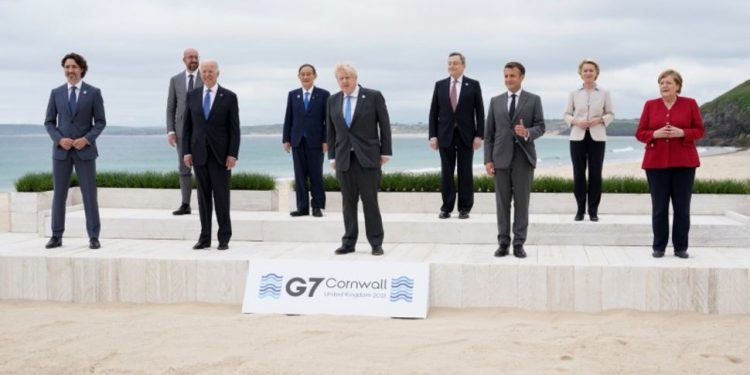The plan of the G-7 countries, currently holding a summit in the UK, to donate one billion COVID-19 vaccine doses to poorer countries has been rightly mocked at by former British Prime Minister Gordon Brown as ‘passing around the begging bowl.’ Various human welfare groups and agencies have likewise dismissed it as too little too late as the world is confronted with a once in a century crisis. Queen Elizabeth II seems to have correctly seized the gravity and magnitude of the crisis, when she reportedly didn’t conceal her angst and asked, tongue in cheek, the beaming G-7 leaders posing for group photographs if they were “supposed to be looking as if you’re enjoying yourselves.” The British Prime Minister Boris Johnson’s reply to the Queen in the affirmative may sound confounding, but in a way it sums up the irony of the fight against the pandemic. For, the G-7 heads of states posing for the photographs were without masks and only maintained the stipulated social distance since they had all got their jabs against COVID-19. They had, indeed, reasons to be without fear and hence cheerful, armed as they are with vaccines, while the world would need a stupendous 11 billion doses to end the pandemic!
Vaccination efforts so far are heavily linked with wealth. Rich countries such as the United States, European countries, Israel and Bahrain are far ahead of other countries in this regard. A total of 2.2 billion people against a world population of over 8 billion have been vaccinated worldwide, according to data collected by Johns Hopkins University. As most people need two vaccine doses and possibly booster shots to tackle emerging variants, charity organisation Oxfam called on G-7 leaders to support a waiver on the intellectual property rights behind the vaccines. Of the 2 billion doses under the G-7 plan, 5 million will be given out by the end of September, 25 million by the year-end and the remaining during 2022. So, the supply is not going to be fast enough.
COVID-19 has ripped through the global economy, with more than 17.5 crore infections reported in more than 210 countries and territories since the first cases were identified in China in late 2019. The World Health Organisation (WHO) estimates 11 billion doses will be needed to vaccinate the whole world to a level of 70 per cent, the point at which transmission of the virus could be significantly checked.
The head of the United Nations, Antonio Guterres, has welcomed the G-7 move, but made it clear much more is needed, warning that if people in developing countries are not inoculated quickly, the coronavirus could mutate further and become resistant to the new vaccines. “We need a global vaccination plan. We need to act with logic, with a sense of urgency and with the priorities of a war economy. We are still far from getting that,” Guterres warned in a no-nonsense manner.
US President Joe Biden and British Prime Minister Boris Johnson have announced they would donate 500 million and 100 million vaccines, respectively, for the world’s poorest nations, while Canada is expected to commit to sharing up to 100 million doses.
While all the G-7 drama along with the Queen’s caustic remark are happening in the UK, the rest of the world is simultaneously watching the Chinese theatre. China has said that ‘the days when global decisions were dictated by a small group of countries are long gone’. This statement clearly puts China on a path of virtual confrontation with the world’s biggest democracies. This is not an unexpected development. China has been at its game of attaining global hegemony for the last few decades. Coronavirus pandemic has forced a new order upon the earth. The virus that originated in a lab in Wuhan, China, has not only wreaked havoc on global health and economy but has also offered China a much higher level of power. The biggest example of Chinese hard power is the inability of all these democracies to respond to the Hong Kong situation. There may have been worldwide demonstrations in support of the second anniversary of the Hong Kong uprising on 12 June 2021 but the G-7 could only voice impotent ‘concern’ about Hong Kong, Xinjiang, South China Sea and Tibet.
That is probably why China could tell the world that these G-7 countries are ‘small’ and cannot dictate global decisions any longer. Chinese economy and the dictatorial government look like it will not tolerate any interference from democracies of the world. When seen through this prism, the G-7 utterances and offerings to the world may have very serious fallouts on the free world in the days to come.







































